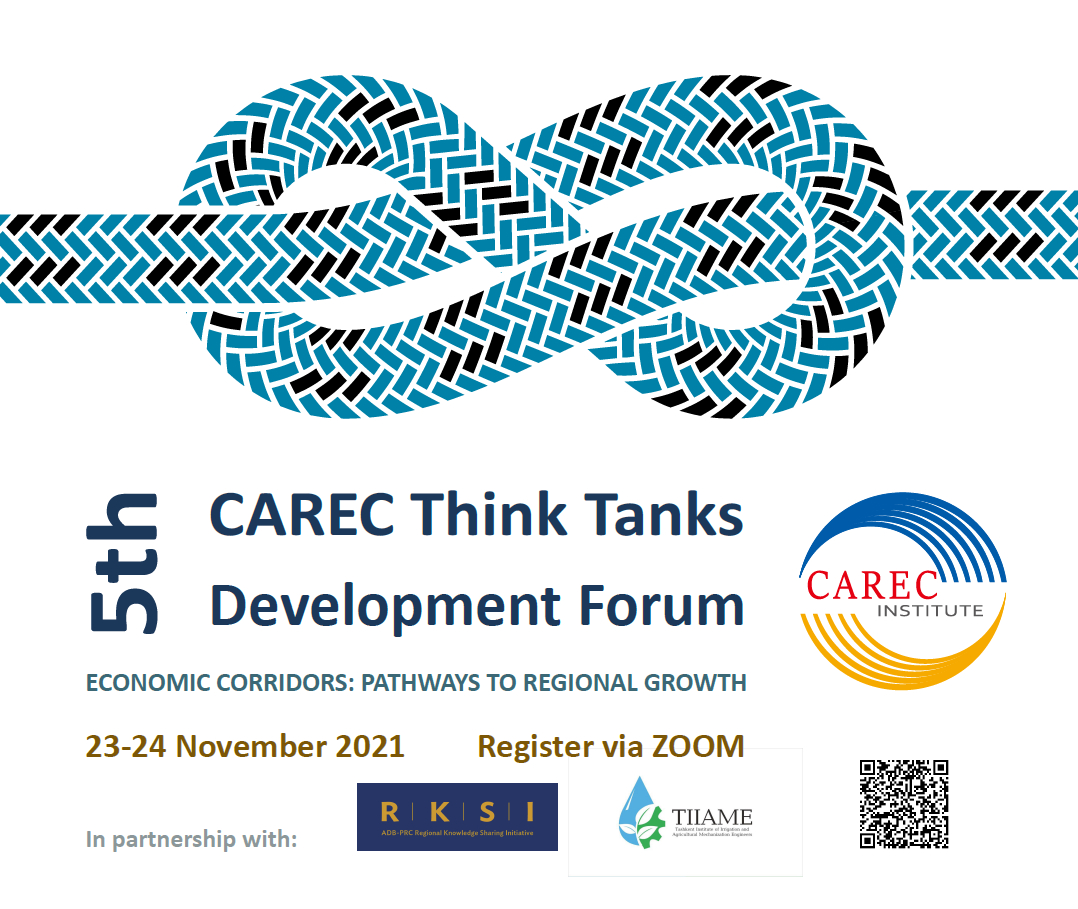Conference & Forum
CAREC Think Tanks Development Forum Economic Corridors: Pathways to Regional Growth
23 Nov 2021 - 24 Nov 2021 Zoom
In view of the significance and potential of economic corridors in promoting trade, growth, and deepening regional integration, the 5th CAREC Think Tanks Development Forum (CTTDF) will be held on 23-24 November 2021 in a virtual mode, under the banner of “Economic Corridors: Pathways to Regional Growth.” It will discuss, among others, the roles of CAREC economic corridors, including the Almaty-Bishkek, Shymkent-Tashkent-Khujand, and China-Pakistan economic corridors, and draw on experiences of Greater Mekong Sub-Region (GMS) and South Asia Sub-Regional Economic Cooperation (SASEC) economic corridors.
Agenda:
| Date | Program |
|---|---|
| Session I: Opening Ceremony | |
| 15:00 – 15:15 | Welcome Remarks, Syed Shakeel Shah, Director, CAREC Institute (5 minutes) Keynote Address, Eugenue Zhukov, Director General, Central and West Asia Department (CWRD), ADB (5 minutes) Group Photo (5 minutes) |
| Session II | |
| 15:15 – 17:00 | Moderator: Lyaziza G. Sabyrova, Principal Regional Economist, CWRD, ADB Economic Overview of the CAREC Region: Setting the Context for Economic Corridors (15 minutes) Hans Holzhacker, Chief Economist, CAREC Institute Economic Corridors as a Vehicle for Economic Growth (20 minutes) Evgeny Vinokurov, Deputy Executive Director, Eurasian Fund for Stabilization and Development (EFSD) and Chief Economist, Eurasian Development Bank, Moscow, Russia Overview of CAREC and BRI Corridors 1. Almaty-Bishkek Economic Corridor (ABEC) (15 minutes) Xinglan Hu, Principal Regional Cooperation Specialist, CWRD, ADB 2. Shymkent-Tashkent-Khujand Economic Corridor (15 minutes) Bahodir Ganiev, Senior Advisor, Center for Economic Development, Tashkent, Uzbekistan 3. China-Pakistan Economic Corridor (CPEC) (15 minutes) Khalid Mansoor, Special Assistant to the Prime Minister of Pakistan on China Pakistan Economic Corridor (CPEC) Q&A/Discussion (25 minutes) |
| Session III | |
| 17:10 – 18:10 | Spatial Planning and Policy Incentives for Developing ECs: Asian Perspectives Moderator: Dingding Tang, Academic member, International Finance Forum (IFF), Beijing, the PRC 1. Greater Mekong Sub-Region (15 minutes) Pawat Tangtrongjita, Managing Director, Socio-Economic Consultants, Pvt, Ltd., Bangkok, Thailand 2. South Asia Sub-Regional Economic Cooperation (SASEC) (15 minutes) Prabir De, Professor, Research and Information System for Developing Countries (RIS), New Delhi, India 3. Insights from an Inter-State Economic Corridor Development Program: The Northern Corridor Economic Region (NCER) in Malaysia (15 minutes) Suresh Narayanan, Professor, School of Social Sciences Universiti Sains Malaysia Q&A/Discussion (15 minutes) |
| 18:10 – 18:20 | Day 1 Wrap-Up, Iskandar Abdullaev, Deputy Director Two, CAREC Institute |
| Date | Program |
|---|---|
| Session IV | |
| 15:00 – 16:00 | Exploring Spin-Offs Moderator: Abid Qayyum Suleri, Executive Director, Sustainable Development Policy Institute (SDPI), Islamabad, Pakistan 1. Cross-border Transport along CAREC Corridors (20 minutes) Ian Greenwood, Infrastructure Consultant, Greenwood Associates, Auckland, New Zealand 2. Tourism Potential along CAREC Economic Corridors (20 minutes) Sanjay Saxena, Managing Director, Total Synergy Consulting Pvt. Ltd, New Delhi, India Q&A/Discussion (20 minutes) |
| Session V | |
| 16:00 – 16:45 | Mapping out the Role of Think Tanks in Economic Corridors Development (15 minutes) Moderator: Tamar Sulukhia Director, ISET Policy Institute, International School of Economics at Tbilisi State University, Georgia Economic Corridors and South-South & Triangular Cooperation (10 minutes) Denis Nkala, Regional Coordinator and Representative, UNOSSC Asia and the Pacific Office CAREC Think Tanks Network Stocktaking and Roadmap (10 minutes) Ziqian Liang, Deputy Director, CAREC Institute Q&A/Discussion (20 minutes) |
| 16:45 – 17:00 | Wrapping up and Closing Remarks, Syed Shakeel Shah, Director, CAREC Institute |


